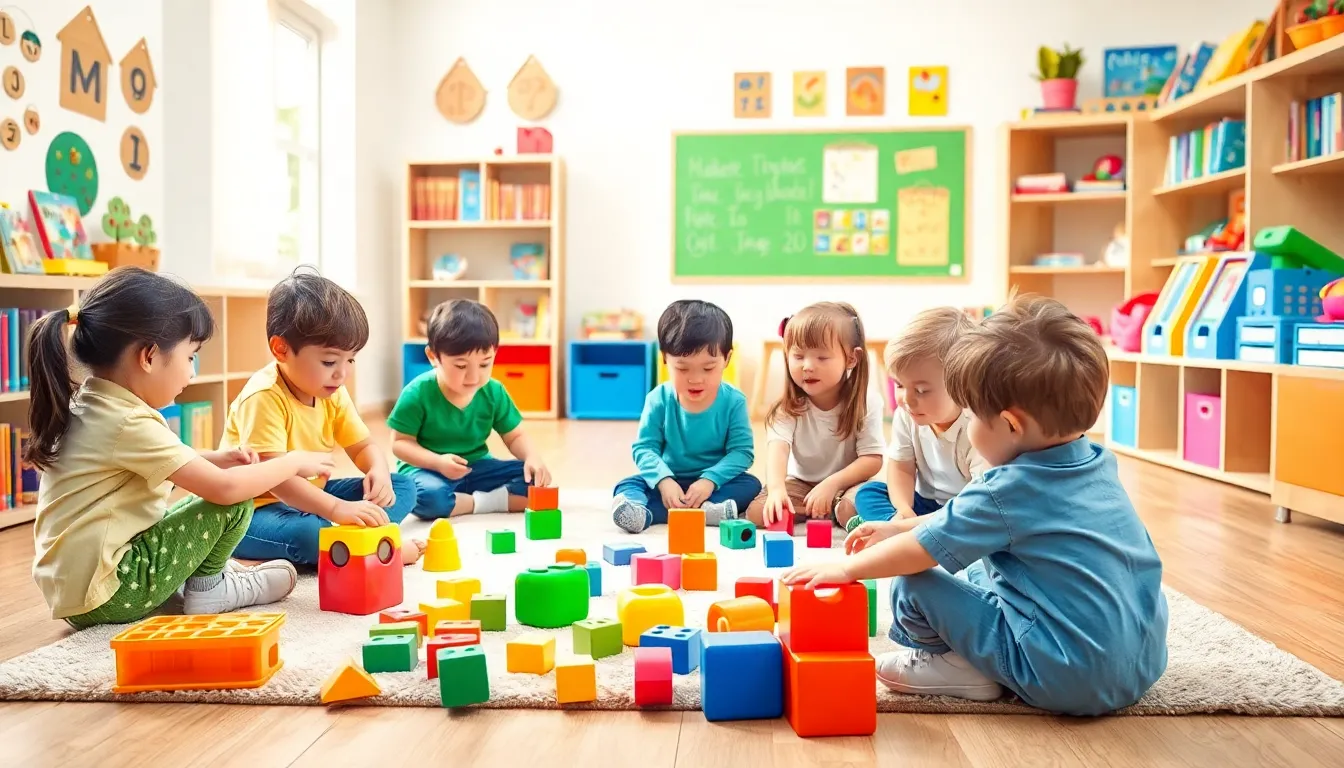Every parent knows that raising a child is like trying to assemble IKEA furniture without the instruction manual—confusing and a bit chaotic. But fear not! Early childhood resources are here to save the day, turning that chaos into a well-orchestrated symphony of learning and fun. From interactive apps to engaging books, these tools can make a world of difference in a child’s development.
Table of Contents
ToggleUnderstanding Early Childhood Resources
Early childhood resources play a crucial role in a child’s development, providing valuable tools for both learning and engagement. These resources simplify parenting challenges and enhance the educational journey for young children.
Importance of Early Childhood Development
Early childhood development significantly influences a child’s future. Studies show that 85% of brain development occurs by age three, underscoring the need for structured learning during these formative years. Engaging resources stimulate cognitive, emotional, and social skills, helping children build a strong foundation. Children who receive quality early development experiences often exhibit improved academic performance in later years, emphasizing the long-term benefits of prioritizing educational support.
Types of Early Childhood Resources
A variety of early childhood resources exist to meet diverse needs. Interactive apps encourage play-based learning and offer tailored educational experiences. Storybooks introduce language skills and foster a love for reading. Educational toys promote hands-on learning and critical thinking through exploration. Additionally, community programs provide social interaction and skill-building opportunities. Parents and caregivers can choose from these resources to create enriching environments that support holistic child development.
Educational Resources for Children


Early childhood development greatly benefits from educational resources. These tools foster engagement, stimulate learning, and support developmental milestones.
Books and Literature
Books play a vital role in early childhood education. They introduce children to language, enhance vocabulary, and improve comprehension skills. Storybooks can evoke imagination and creativity, helping children learn about the world around them. Engaging illustrations and relatable characters capture their interest, making reading enjoyable. Reading aloud fosters bonding between caregivers and children while aiding in language acquisition. Research indicates that children exposed to a variety of literature in their early years tend to excel academically. Parents can also utilize book-related activities, such as discussing story themes or asking open-ended questions, to reinforce learning.
Educational Toys and Games
Educational toys and games serve as essential resources for early learning. They promote critical thinking, problem-solving, and motor skills development. Toys like building blocks, puzzles, and interactive games encourage hands-on exploration while fostering creativity. Additionally, many toys align with specific educational goals, such as teaching numbers, letters, or social skills. Collaborative games enhance teamwork and communication among peers, strengthening social connections. Parents and caregivers often find value in selecting age-appropriate toys that match children’s developmental stages. Investing in diverse educational toys supports holistic growth and prepares children for future challenges.
Support for Parents and Caregivers
Support for parents and caregivers plays a crucial role in navigating the complexities of early childhood development. Various resources exist to provide guidance, encouragement, and community.
Parenting Classes and Workshops
Parenting classes equip caregivers with essential knowledge and skills. Topics often include child development stages, effective communication, and discipline strategies. Research indicates that participation in these classes leads to better parenting practices, enhancing children’s emotional well-being. Workshops also provide hands-on activities, allowing caregivers to practice techniques in real-time. Group interactions offer a chance to ask questions and share experiences. Many local organizations and online platforms offer these resources at little or no cost, making them accessible for everyone.
Online Communities and Forums
Online communities create a space for parents to connect and share insights. Members share experiences, advice, and resources related to early childhood development. Forums often feature expert input, allowing caregivers to obtain accurate information. Participation fosters a sense of belonging, reducing feelings of isolation. Numerous platforms focus specifically on parenting, providing tailored discussions and support groups. Active engagement in these communities can enhance parenting knowledge and overall confidence in managing challenges.
Accessing Early Childhood Resources
Accessing early childhood resources is vital for supporting children’s growth. Numerous options exist for parents and caregivers.
Government Programs and Funding
Government programs play an essential role in providing early childhood resources. Federal and state initiatives offer funding to enhance child education. For instance, Head Start programs receive federal support, benefiting low-income families. These initiatives create opportunities for early learning, ensuring children receive quality education from a young age. Local agencies often disseminate information about available programs, helping families connect to necessary resources. Grants and scholarships may also assist in obtaining educational materials, such as books and toys. Families looking for financial support can explore these government-funded options to foster a positive learning environment for their children.
Non-Profit Organizations and Initiatives
Non-profit organizations significantly contribute to early childhood education. Various initiatives focus on providing resources and support to families in need. Local non-profits often offer free workshops, distributing educational materials to parents and caregivers. Organizations like First Book provide access to new books and educational resources, promoting literacy among young children. Community programs frequently partner with schools to offer enrichment activities that enhance learning experiences. By leveraging these non-profit initiatives, families can find valuable resources and connect with others striving for the same goal of supporting child development.




